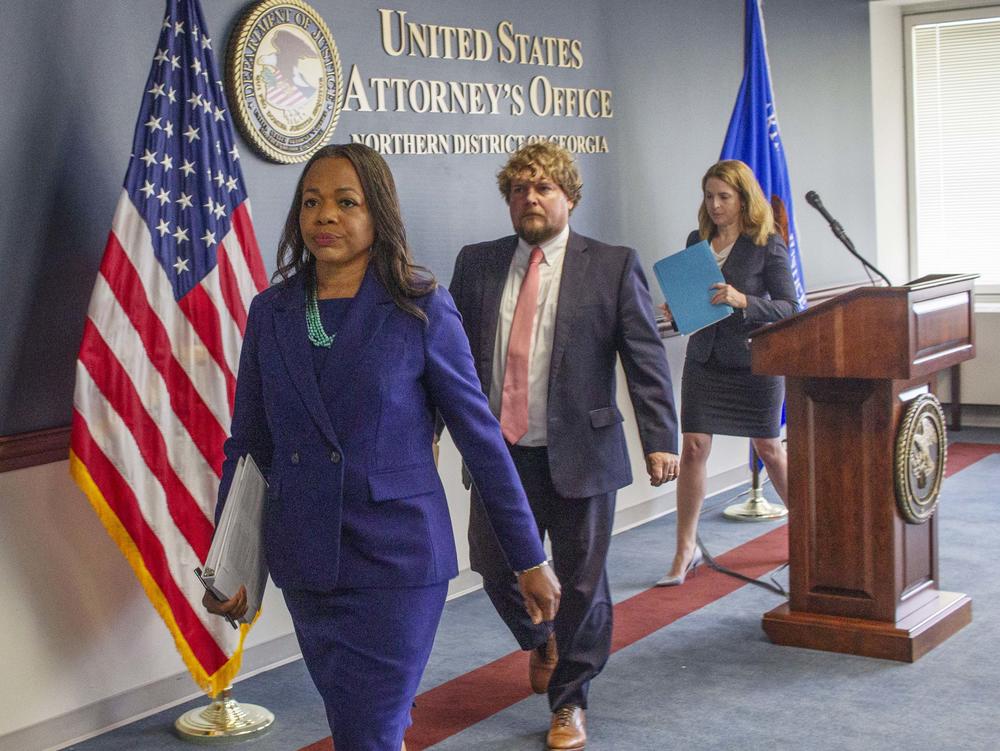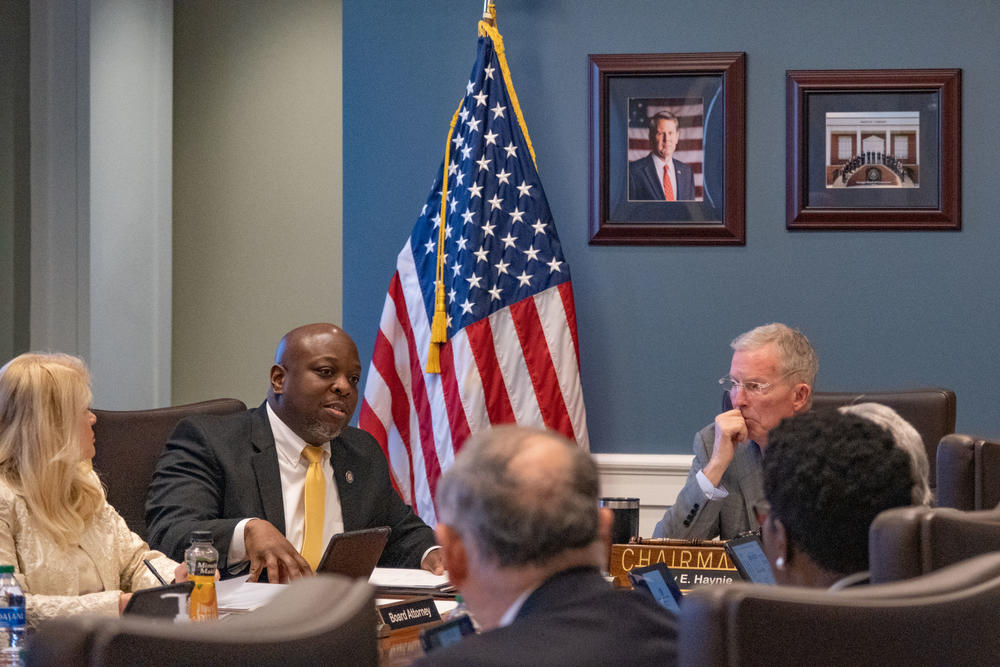
Caption
Carrie Proffitt protests in 2023 across from the Georgia Governor's Mansion with photos of her son who took his own life in a Georgia Department of Corrections prison.
Credit: Grant Blankenship/GPB News
|Updated: April 23, 2025 4:51 PM
LISTEN: After a yearslong investigation, the Department of Justice says violence in Georgia prisons is at a "crisis level." GPB's Grant Blankenship reports.

Carrie Proffitt protests in 2023 across from the Georgia Governor's Mansion with photos of her son who took his own life in a Georgia Department of Corrections prison.
In a blistering, just-released report years in the making, the federal Department of Justice describes Georgia’s prison system as anarchic and operating with little regard for the constitutional rights of the most vulnerable incarcerated people in its care.
What’s more, the report compiled by the DOJ’s Civil Rights Division maintains none of this is news to the Georgia Department of Corrections.
“The State is deliberately indifferent to these unsafe conditions,” reads a line barely out of the report’s table of contents.
At the formal announcement for the report at a federal building in downtown Atlanta, U.S. Assistant Attorney General Kristen Clarke said the findings were “among the most severe violations that we have uncovered in an investigation of this kind.”
Nationwide the DOJ has opened 15 investigations into prison systems.
The investigation into Georgia’s prison system relied heavily on thousands of documents supplied by the GDC and local agencies, and hundreds of interviews with prison staff and those who advocate for the incarcerated.
Together, the words “indifferent” and “indifference” occur over a dozen times in the report.

U.S. Assistant Attorney General Kristen Clarke (left) leads U.S. Attorney Peter Leary of the Middle District of Georgia and U.S. Attorney Jill Steinberg of the Southern District of Georgia out of a downtown Atlanta conference room following a formal announcement of the Department of Justice's investigation into Georgia prisons.
The 94-page report follows an investigation which began in 2021 and depicts a correctional system where rates of homicide and sexual violence outstrip those of other state prison systems largely due to an inability to provide adequate numbers of correctional officers. For example, while the state’s prison census has doubled since 1990, the number of correctional officers is only at 50% of full staffing.
In one typical example at a close security prison, one officer was responsible for tracking 400 beds. Absent more officers, the report states gangs are left in control of prison units where the incarcerated can often unlock their own cells and wander at will.
Narissa Wright’s son DonTavis Mintz died in Georgia’s Ware State Prison. His body was not discovered for days. When his remains were returned to her, she only knew they were his by a single tooth.
“If he's laying there a couple of days, that means no one fed him,” Wright said in 2021. “How did he eat? Who did counts? Who came around to check on them?”
In their report, DOJ investigators described a general inability to conduct the kinds of daily counts of the incarcerated it describes as basic to the function of a prison. And so without that baseline control, the report says GDC cedes real control of prisons to gangs.
That, in turn, breeds violence.
“Violence in the Georgia prisons has reached a crisis level," reads one line.
Investigators revealed that 35 people were killed across the state’s facilities in 2023, though likely an “underestimate,” Assistant Attorney General Clarke said, citing inaccurate documentation and reporting of deaths by the GDC.
Included in the deaths that the DOJ says the GDC could have prevented are employees. In June, a food service worker was killed in an altercation with a prisoner. In other cases, correctional officers have been killed or injured.
“Violence and lack of supervision and control in state facilities too often threatens those who are outside the prison walls,” said Jill Steinberg, U.S. attorney for the Southern District of Georgia.
That said, investigators say GDC places too much blame for the violence on gangs. Instead, investigators say, emphasis should remain on the lack of correctional officers as the main driver of disorder.
“Our findings reveal that the leadership of the Georgia Department of Corrections has lost control of its facilities,” said Ryan Buchanan, U.S. attorney for the Northern District of Georgia, on Tuesday.
That doesn’t just result in violence among prisoners. It has also resulted in incarcerated people “dying at an alarming and unacceptable rate,” Buchanan said.
The Georgia Department of Corrections stopped reporting causes of death for people in its custody this spring, in response to requests from GPB and other media outlets.
But an analysis of prison deaths between 2015 and 2023 shows people in our state prisons die from so-called “natural causes” at double, sometimes triple the rate than the rest of the state population. That includes death from sepsis, from COVID-19, untreated hernias, and urinary tract infections.
Cody Bailey’s father, James Michael Bailey, was 44 years old and about four months into his sentence at Dooly State Prison in Unadilla when he died from sepsis, contracted from pneumonia that was caused by an infected insect bite.
Cody Bailey said he hasn’t been able to get any records from the hospital or the Georgia Department of Corrections on what actually happened, such as to know what insect might have bitten his dad, and how it became fatal.
“From what the doctor told me, I just feel like they kind of just put it on the back burner,” Bailey said.

Georgia Department of Corrections Commissioner Tyrone Oliver, second from left, in a recent meeting of the State Board of Corrections.
While the report recommends GDC take a zero-tolerance approach to all forms of sexual violence, it directs particular attention to the safety of LGBTQ people.
“GDC houses transgender women with men based on their external genitalia despite the risk this poses to their safety,” reads the report. Authors recommend not only ending that practice but also further screening the incarcerated so as to understand who are likely to be victimized and who are likely to commit violence — and then taking pains to house them away from each other.
Though the DOJ did not provide any more information on the breadth of sexual abuse violations that have gone unanswered, representatives emphasized thousands of incident reports that were included in the investigation.
In an initial response, GDC representative Joan Heath referred to the report as allegations which “reflect a fundamental misunderstanding of the current challenges of operating any prison system.” Heath further said contrary to how GDC was depicted in the report, the agency was fully compliant with the DOJ investigation. The report states that even now, GDC has failed to fully cooperate.
In addition to adopting zero tolerance for sexual violence, the report includes 82 other recommendations, such as hiring the right number of guards, allowing third-party transparency into the workings of the prison system and fully investigating allegations of sexual violence based on a preponderance of the evidence rather than a standard of definitive proof.
The Georgia investigation follows similar investigations into conditions in Alabama and Mississippi prisons.
The Georgia Department of Corrections now has 49 days to formally respond.